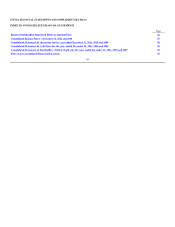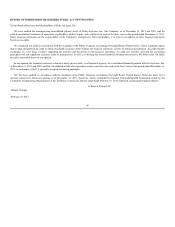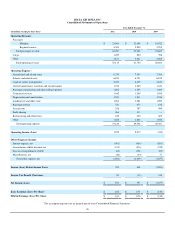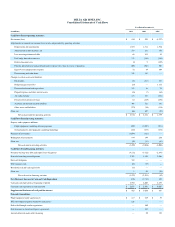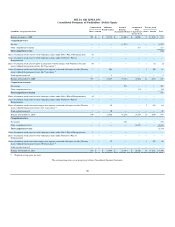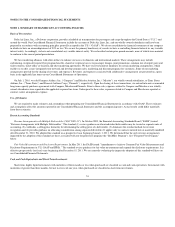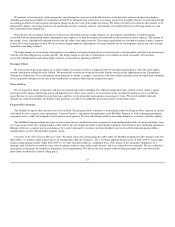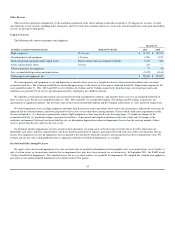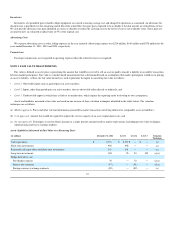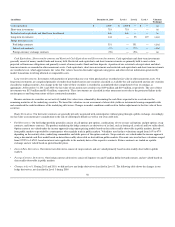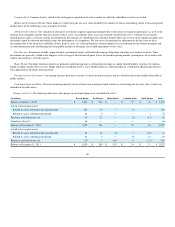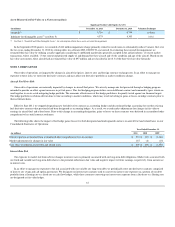Delta Airlines 2011 Annual Report Download - page 61
Download and view the complete annual report
Please find page 61 of the 2011 Delta Airlines annual report below. You can navigate through the pages in the report by either clicking on the pages listed below, or by using the keyword search tool below to find specific information within the annual report.
We perform, at least quarterly, both a prospective and retrospective assessment of the effectiveness of our derivative contracts designated as hedges,
including assessing the possibility of counterparty default. If we determine that a derivative is no longer expected to be highly effective, we discontinue hedge
accounting prospectively and recognize subsequent changes in the fair value of the hedge in earnings. We believe our derivative contracts that continue to be
designated as hedges, consisting of interest rate and foreign currency exchange contracts, will continue to be highly effective in offsetting changes in cash
flow attributable to the hedged risk.
Hedge Margin. In accordance with our fuel, interest rate and foreign currency hedge contracts, we may require counterparties to fund the margin
associated with our gain position and/or counterparties may require us to fund the margin associated with our loss position on these contracts. The amount of
the margin, if any, is periodically adjusted based on the fair value of the hedge contracts. The margin requirements are intended to mitigate a party's exposure
to the risk of contracting party default. We do not offset margin funded to counterparties or margin funded to us by counterparties against fair value amounts
recorded for our hedge contracts.
The hedge margin we receive from counterparties is recorded in cash and cash equivalents or restricted cash, cash equivalents and short-term investments,
with the offsetting obligation in accounts payable. The hedge margin we provide to counterparties is recorded in accounts receivable. All cash flows
associated with purchasing and settling hedge contracts are classified as operating cash flows.
Passenger Tickets
We record sales of passenger tickets in air traffic liability. Passenger revenue is recognized when we provide transportation or when the ticket expires
unused, reducing the related air traffic liability. We periodically evaluate the estimated air traffic liability and record any adjustments in our Consolidated
Statements of Operations. These adjustments relate primarily to refunds, exchanges, transactions with other airlines and other items for which final settlement
occurs in periods subsequent to the sale of the related tickets at amounts other than the original sales price.
Taxes and Fees
We are required to charge certain taxes and fees on our passenger tickets, including U.S. federal transportation taxes, federal security charges, airport
passenger facility charges and foreign arrival and departure taxes. These taxes and fees are assessments on the customer for which we act as a collection
agent. Because we are not entitled to retain these taxes and fees, we do not include such amounts in passenger revenue. We record a liability when the
amounts are collected and reduce the liability when payments are made to the applicable government agency or operating carrier.
Frequent Flyer Program
The SkyMiles Program offers incentives to travel on Delta. This program allows customers to earn mileage credits by flying on Delta, regional air carriers
with which we have contract carrier agreements (“Contract Carriers”) and airlines that participate in the SkyMiles Program, as well as through participating
companies such as credit card companies, hotels and car rental agencies. We also sell mileage credits to non-airline businesses, customers and other airlines.
The SkyMiles Program includes two types of transactions that are considered revenue arrangements with multiple deliverables. As discussed below, these
are (1) passenger ticket sales earning mileage credits and (2) the sale of mileage credits to participating companies with which we have marketing agreements.
Mileage credits are a separate unit of accounting as they can be redeemed by customers in future periods for air travel on Delta and participating airlines,
membership in our Sky Club and other program awards.
Passenger Ticket Sales Earning Mileage Credits. Passenger ticket sales earning mileage credits under our SkyMiles Program provide customers with two
deliverables: (1) mileage credits earned and (2) air transportation. Effective January 1, 2011, we began applying the provisions of ASU 2009-13 to passenger
tickets earning mileage credits. Under ASU 2009-13, we value each deliverable on a standalone basis. Our estimate of the standalone selling price of a
mileage credit is based on an analysis of our sales of mileage credits to other airlines and customers and is re-evaluated at least annually. We use established
ticket prices to determine the standalone selling price of air transportation. We allocate the total amount collected from passenger ticket sales between the
deliverables based on their relative selling prices.
53


